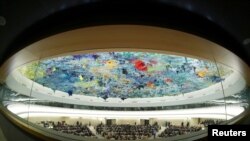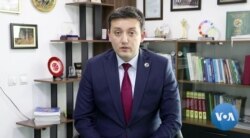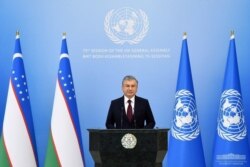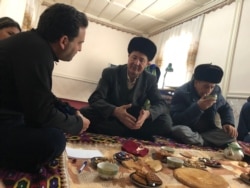Uzbekistan is poised to join the U.N. Human Rights Council in January alongside two authoritarian stalwarts, Russia and China. But while Western capitals deride Moscow and Beijing’s membership, they have welcomed Tashkent’s accession as an opportunity to advance that Central Asian country’s stuttering human rights reforms.
Uzbekistan’s progress – and how far it still has to go – is demonstrated by the case of Bobomurod Abdullayev, a former political prisoner who was recently granted a fully furnished apartment in the capital, which he said is a gift from President Shavkat Mirziyoyev.
Suspected of anti-constitutional activities, Abdullayev was extradited from Kyrgyzstan last month and quickly freed. “I’m innocent,” Abdullayev said. But his case remains under investigation by the State Security Service under what VOA sources say is a gag order.
Reform-minded officials and lawmakers point to considerable progress in the four years since Mirziyoyev took power. There is greater freedom in every sphere, they say, highlighted by an emboldened domestic media that has not shied away from covering long-standing problems.
Bobur Bekmurodov, a parliamentarian and chairman of the Yuksalish National Movement, whose mission is to promote reforms, said there is enough will in the system and among citizens to transform the country.
“We know there are many problems but are ready for the challenges that come with UNHRC membership and will use it build on progress made so far,” he said.
“Transformation from a closed to open society is hard,” Bekmurodov said. But “President Mirziyoyev really means it when he says Uzbekistan will not change course.”
But for Abdujalil Boymatov, a Europe-based activist, membership on the UNHRC is more a boost to Mirziyoyev’s image than a reflection of Uzbekistan’s human rights trends, which he views as negative overall.
Boymatov said he recognizes “some good decisions” by Mirziyoyev but sees them “not as institutional reforms but cosmetic."
He points out that there is no political opposition in Uzbekistan, no party that can challenge the president. Torture and inhumane interrogation are banned but persist. Several journalists and bloggers have been detained, questioned and harassed for investigating corruption and questioning policy. While none has gone to prison since Mirziyoyev came to power, those who talked to VOA said they now work in constant fear.
Alisher Kadirov, deputy speaker of the Legislative Chamber and head of the “Milliy Tiklanish” (National Revival) Party, said there would be no substantial improvement in the rule of law “unless the emphasis on rights is matched by citizens’ commitment to duties and obligations.”
Freedoms must be matched by responsibility, Kadirov added.
Activists and bloggers agree that citizens must care about the rights of others, not just their own. But they point to a record of abuse and persecution of individuals.
From 1991 to 2016, thousands of people were imprisoned and tortured just for questioning the authorities, said Steve Swerdlow, a human rights lawyer now teaching at the University of Southern California.
“Uzbekistan’s election to the UNHRC reflects shifts from an insular, isolated posture under [former President] Islam Karimov to outward facing regional and global engagement under Mirziyoyev,” Swerdlow said.
But membership will intensify international scrutiny. And the West wants continuous progress on human rights, justice and judicial reforms.
U.S. officials stressed that membership on the human rights council cannot substitute for tangible progress and commitment to further improvements.
The U.S. Embassy in Tashkent tweeted: “Uzbekistan’s election to the #UNHRC is a timely opportunity to demonstrate its stated commitment to human rights reforms – both here in Uzbekistan and on the world stage. The U.S. supports @GOVuz in implementing its reform agenda.”
Helena Fraser, the U.N. chief in Uzbekistan, said that UNHRC membership is both a privilege and responsibility.
Speaking on state television, Fraser laid out a list of U.N. priorities for Uzbekistan, which included empowering civil society and the media, judicial independence, and ratification of U.N. protocols and conventions against torture and on the rights of people with disabilities.
The U.N. is committed to help implement a national human rights strategy, she said.
Swerdlow, who spent years in Central Asia studying human rights, urges Uzbekistan to reckon with its recent past.
The country could set an example with an unprecedented yet necessary conversation about who abused whom, why and how, and most importantly, how to stop systemic violations, he said.
But Tashkent remains unwilling to discuss abuses during former President Karimov’s leadership. Officials say they are looking forward and see no use in litigating the past.
Some officials even say they don’t see the past as dark or abusive, while others fear that opening that “Pandora’s box” may distract Uzbekistan from “its current, more critical issues.”
But former political prisoners are unwilling to wait for justice.
Chuyan Mamatkulov spent six years behind bars, including time in the notorious Jaslik prison, which was closed by Mirziyoyev in 2019.
The 50-year-old former army officer was convicted in 2012 on what he says were false charges of conspiring to subvert the constitutional order, abduction, fraud and perjury. He has sued for compensation and vindication and vows to go to the Supreme Court.
Other former political prisoners who languished longer behind bars told VOA they want their names cleared of crimes they never committed, not just compensation. Imprisonment on bogus charges cost them years and their health, they said, adding they want their honor restored and acknowledgement by the government.
International watchdogs encourage Tashkent to act now. Swerdlow asked, if Uzbekistan cannot ensure justice today for what happened yesterday, how can it ensure justice for today’s violations tomorrow?
Critics also worry that by joining Moscow and Beijing on the Council, Tashkent will be boxed in from criticizing them. Said activist Boymatov: “Uzbek-Chinese ties have strengthened, so we can’t expect Uzbekistan to criticize Chinese policy toward the Uighurs in the UNHRC.”
Two precedents further fuel the skepticism: Neighboring Kazakhstan and Kyrgyzstan were UNHRC members yet made no major progress.
Kazakhstan is still rated as “not free” in Freedom House’s annual rating of political rights and civil liberties worldwide, while Kyrgyzstan, twice a member, has been only “partially free” for years, with internet freedom declining.







